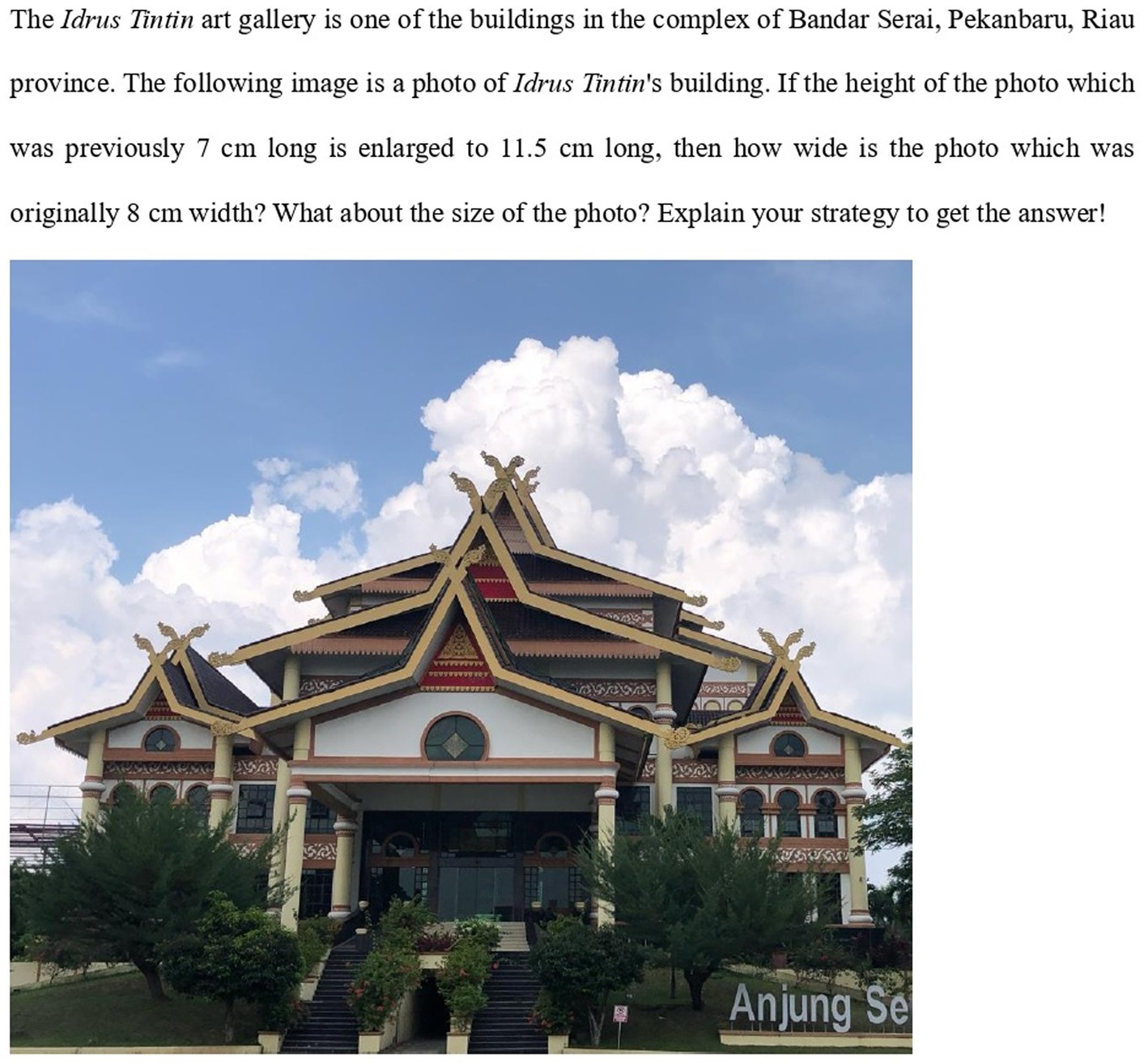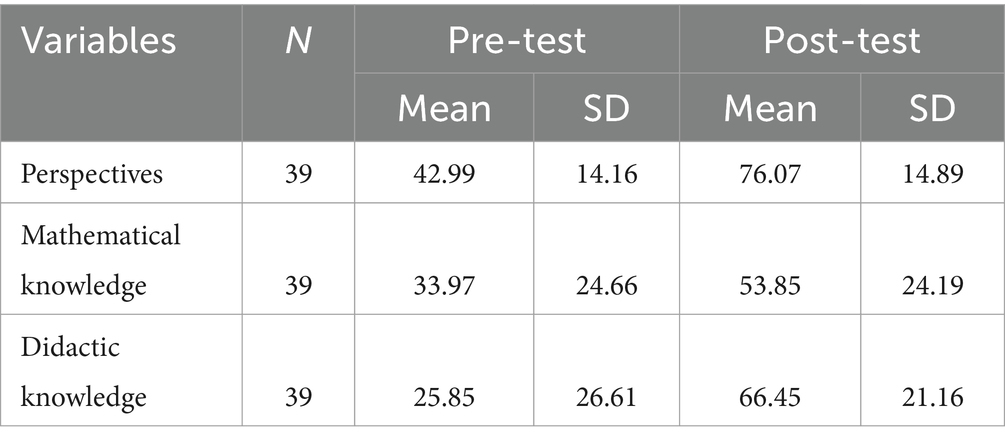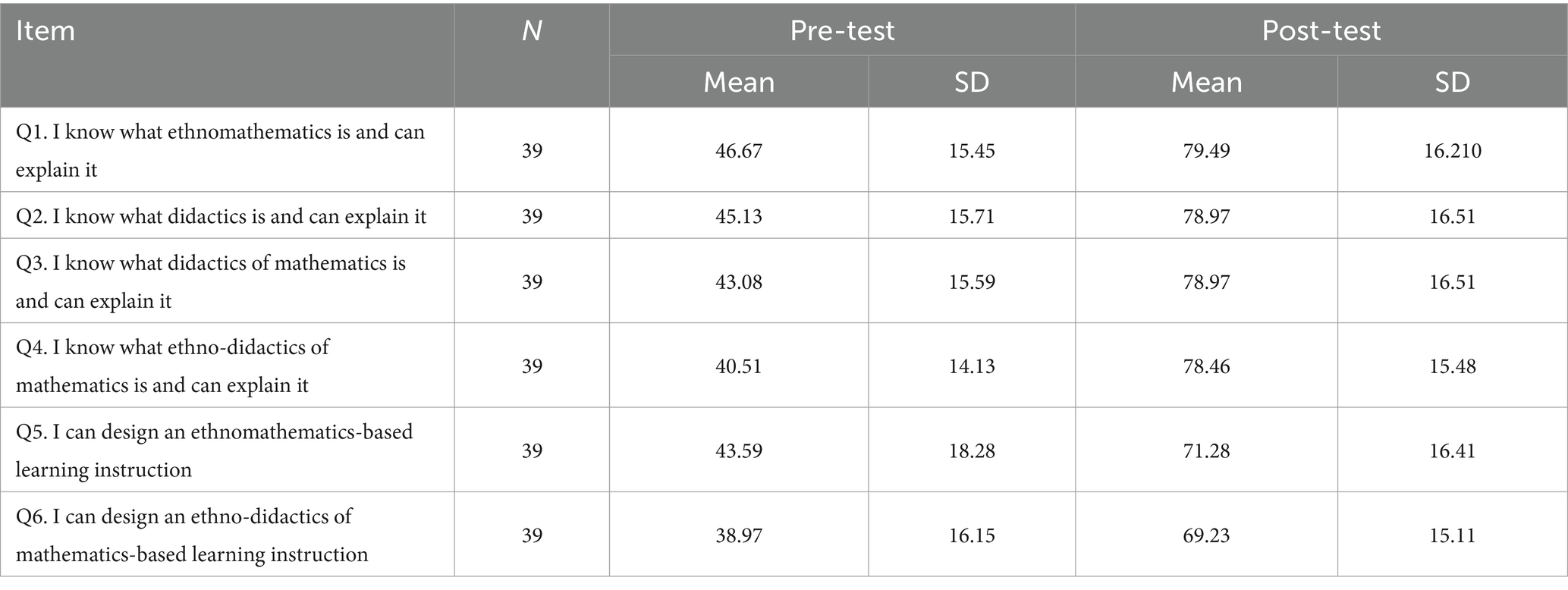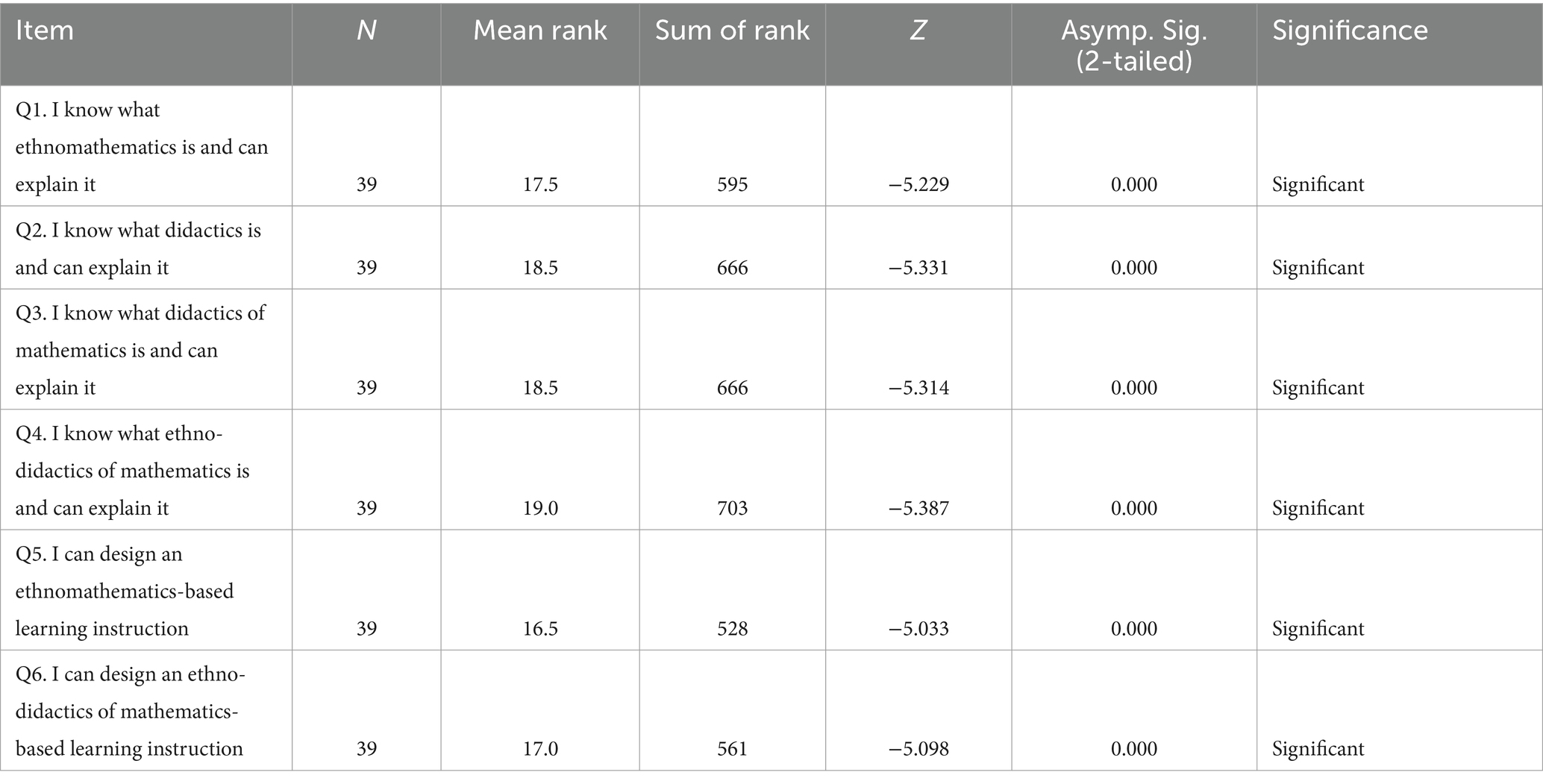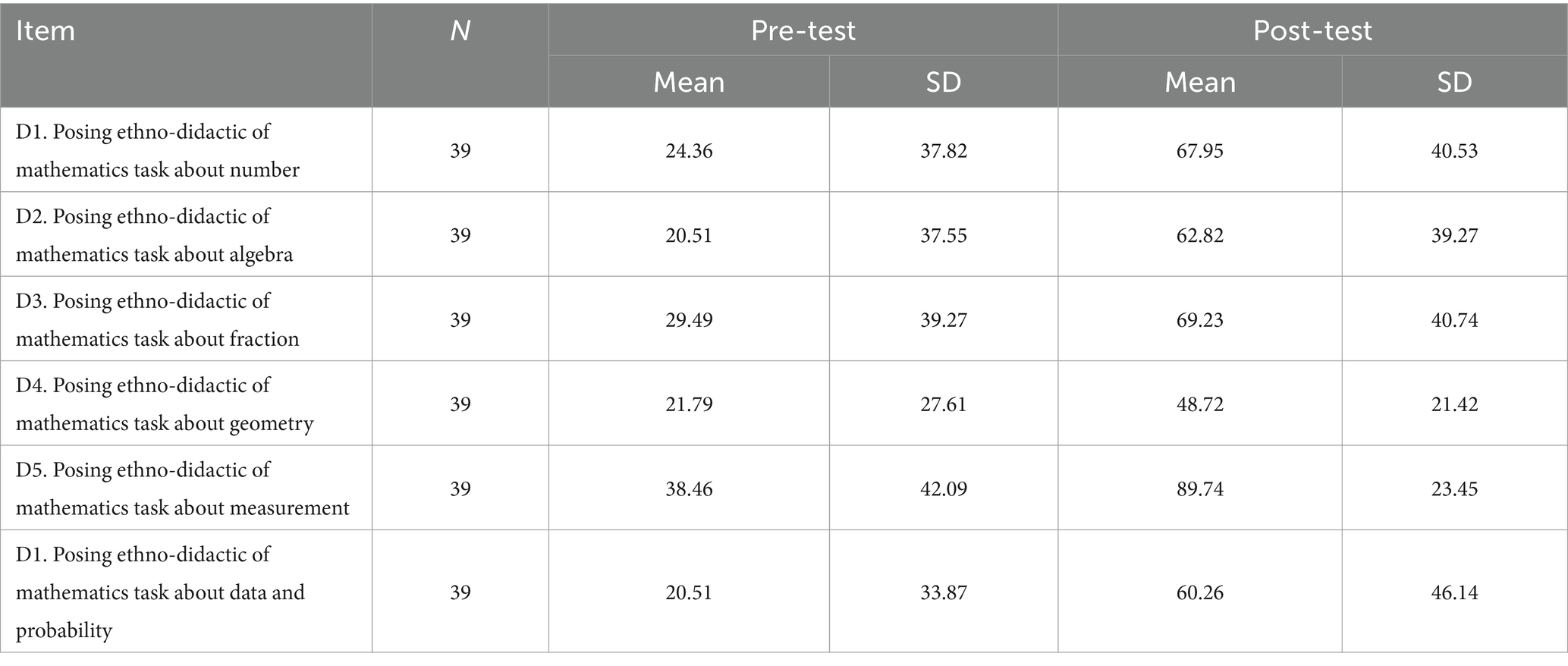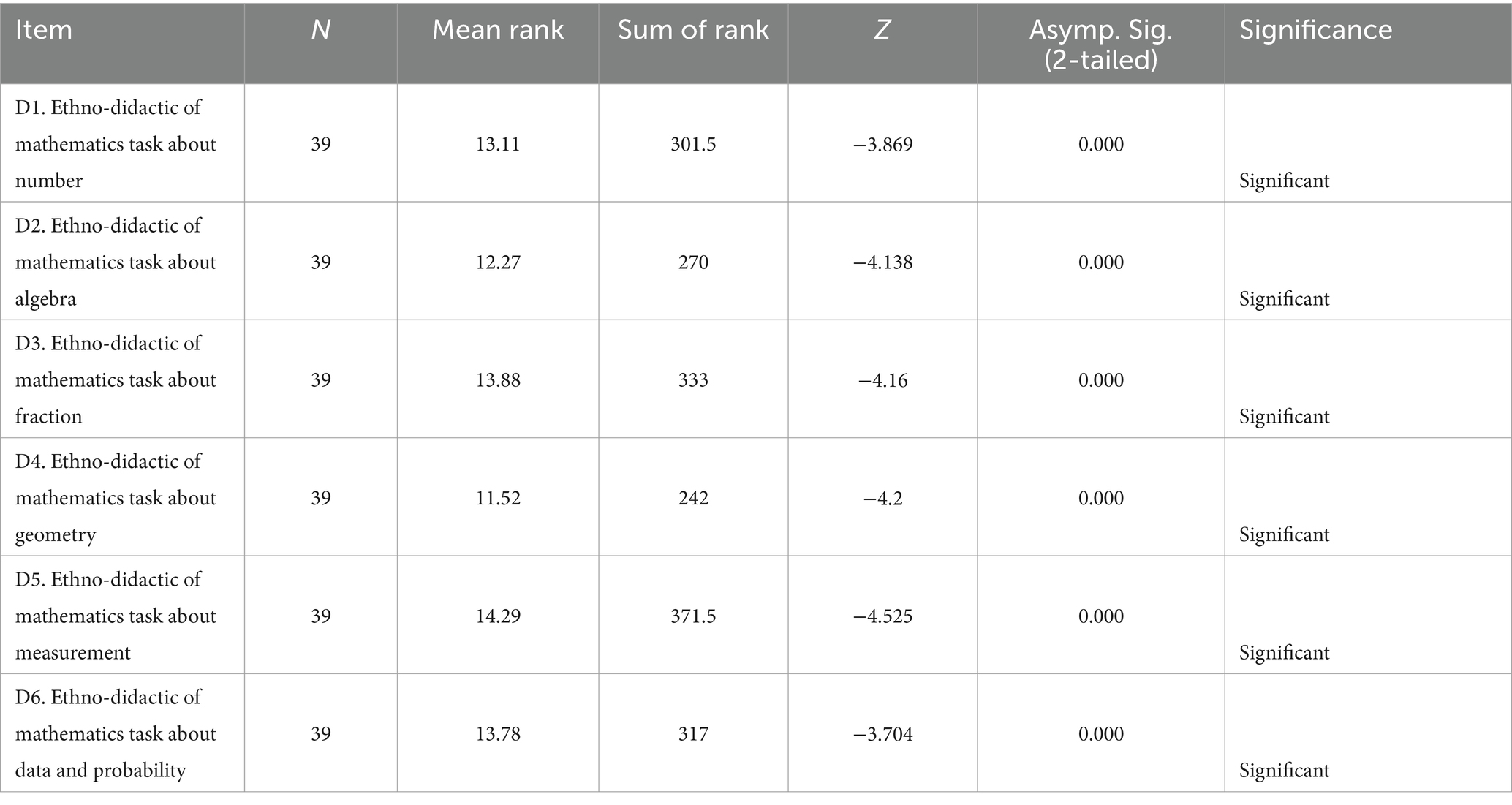- 1Department of Elementary Education, Faculty of Teacher Training and Education, University of Riau, Riau, Indonesia
- 2Department of English Education, Faculty of Teacher Training and Education, University of Riau, Riau, Indonesia
Research indicates that both pre-service and in-service teachers struggle with explaining mathematical concepts to elementary school students due to insufficient mathematical and didactic knowledge. This study aims to examine the effects of Project-Based Ethno-Didactics of Mathematics Learning on pre-service elementary teachers’ perspectives, mathematical knowledge, and didactic knowledge. This is a quasi-experimental study with a one-group pre-test and post-test design. The participants in the study were 39 s-year pre-service elementary teachers from a public university in Riau province, Indonesia, enrolled in an elementary school teacher education program. A non-parametric statistical test (Wilcoxon test) was utilized to analyze the data and test the hypothesis. The findings of this study revealed that Project-Based Ethno-Didactics of Mathematics Learning has a significant effect on pre-service elementary teachers’ perspectives, mathematical knowledge, and didactic knowledge. However, some areas of mathematical and didactic understanding showed only moderate gains, suggesting the need for deeper integration of content-specific ethno-didactics strategies in teacher education programs.
1 Introduction
The proliferation of technological developments and the fourth industrial revolution that have impacted the world have not brought significant changes to education in Indonesia. This can be observed from the results of the Program for International Student Assessment (PISA) implemented by the OECD, where the abilities of Indonesian students still lag behind the global average. Particularly, the average mathematics score for Indonesian students is only 366, compared to the OECD average score of 472 (OECD, 2023). This poses a challenge for policymakers and educational developers, as the current programs implemented are still far from meeting expectations in enhancing students’ literacy and numeracy skills.
The slow pace of change in education in Indonesia, particularly in mathematical competence, is attributed to various factors, one of which is a low level of mathematical, didactic, and technological knowledge among teachers. The results of the latest study conducted by Putra et al. (2022) reveal that teachers’ mathematical and didactic knowledge obtained an average score of 3.71 on a scale of 5, indicating that their knowledge is still unsatisfactory. Several other studies related to teachers’ mathematical and didactic knowledge have found that both pre-service teachers and teachers struggle to explain mathematical concepts to elementary school students (Biehler et al., 1994; Neto et al., 2020; Putra et al., 2021). Many of them also experienced difficulties in understanding mathematical concepts such as fractions (Johar et al., 2017; Thanheiser et al., 2010). Research conducted by Neto et al. (2020) on teachers’ mathematical and didactic knowledge in Angola concluded that their knowledge remains at a low level. Meanwhile, didactic knowledge is essential for teachers to effectively convey mathematical knowledge using procedures and concepts when solving mathematical problems (Díaz and Poblete, 2017; Putra, 2019b). Mathematical and didactic knowledge, to some extent, looks similar to content knowledge (CK) and pedagogical content knowledge (PCK) (Cueto et al., 2017), which have been widely recognized as crucial components in mathematics education (Shulman, 1986). However, it goes beyond teachers’ practices but also theories (Putra, 2019a). Teachers’ mathematical knowledge relates to the mathematical concepts, such as using techniques and theories of learning mathematics, and the didactic knowledge refers to the conditions and mechanisms of mathematics teaching and learning, requiring an analysis specific to the target knowledge (Putra, 2019a; Winsløw and Durand-Guerrier, 2007).
Teachers’ mathematical and didactic knowledge, particularly in Indonesia, still primarily focuses on teaching elementary school students using procedural techniques and methods (Putra, 2019b). Consequently, when students forget these techniques and methods, they struggle to solve the presented mathematical problems. This is because teachers and pre-service teachers fail to explain the underlying concepts behind solving mathematical problems using appropriate approaches (Putra, 2019b). On the other hand, a study conducted by Hill et al. (2005) examined how teachers’ mathematical knowledge in teaching contributes to increased student mathematics achievement. One way to innovate mathematics learning for teachers and pre-service teachers is to adopt a mathematics learning philosophy that is developed within the country.
Researchers have seen a gap between the mathematical and didactic knowledge that teachers should have and what they currently possess. Their mathematical and didactic knowledge needs to be prepared, and they need to optimize the national culture in supporting mathematics learning in elementary schools. This is because Indonesia is known as a country rich in ethnicity and culture. Indonesia, as the fourth most populous country in the world, consists of more than 17.000 islands and has more than 1.300 ethnic groups, each with diverse cultural traditions and educational perspectives (Astari et al., 2024; Gerdts et al., 2022). However, despite its rich cultural, the education system still faces challenges in effectively integrating these cultural elements into learning, especially in mathematics education (Novikasari et al., 2024; Payadnya et al., 2024; Wulandari et al., 2024).
The connection between mathematics and culture is an idea that has developed long before, or it could be said that mathematics emerged because of the needs and civilization of a culture. The combination of culture and mathematics is known as ethnomathematics (D’Ambrosio, 1985). Therefore, this research aims to implement a learning approach that combines project-based learning with ethnomathematics, and didactics of mathematics, called the Project-based Ethno-Didactics of Mathematics Learning, to increase pre-service elementary teachers’ perspectives, mathematical knowledge, and didactic knowledge. Thus, the research questions of this study are:
1. How does project-based ethno-didactics of mathematics learning impacts pre-service elementary teachers’ perspectives on instructional learning based on ethno-didactics of mathematics?
2. How does project-based ethno-didactics of mathematics learning impacts pre-service elementary teachers’ mathematical knowledge?
3. How does project-based ethno-didactics of mathematics learning impacts pre-service elementary teachers’ didactic knowledge?
2 Theoretical background
2.1 Team-based projects
Team-based projects are a form of intensive and specific small group-based learning (Hrynchak and Batty, 2012). The problem-solving process in team-based projects is carried out in groups (Lightner et al., 2007). This learning model is ideal for implementation in universities because it provides space for students to develop their knowledge and skills. Therefore, the Ministry of Education, Culture, Research, and Higher Education of the Republic of Indonesia emphasizes the importance of real experience and cooperative learning, which can be expressed in team-based projects (Kemendikbudristek, 2021). Team-based project learning in higher education aims to improve the quality of learning and the relevance of higher education to the world of work. This means that universities must have the ability to design and implement learning in innovative ways so that students can achieve learning that includes their attitudes, knowledge, and skills most effectively.
Empirical research has demonstrated that team-based projects contribute significantly to teachers’ professional growth. For example, Baum et al. (2017) found that collaborative projects improved college students’ foundational mathematical knowledge and research capabilities. Similarly, Tauro et al. (2017) reported that integrating mechatronics in project-based learning positively influenced teacher pedagogical development and student engagement in STEM education. In addition, The integration of team-based project into educational practices provides a framework to engage pre-service teachers in collaborative, innovative, and reflective learning experiences, thereby improving pre-service teachers’ outcomes and fostering a deeper understanding of mathematics (Makamure, 2025). These findings underscore the potential of team-based projects to cultivate pre-service teachers’ mathematical and didactic knowledge through active learning and collaboration.
2.2 Ethno-didactic of mathematics
D’Ambrosio, a Brazilian mathematician, introduced ethnomathematics in 1977. According to him, ethnomathematics is mathematics used by identifiable cultural groups such as work groups, children of certain age classes, and professional classes (D’Ambrosio and Ascher, 1994). D’Ambrosio (1985) states that the purpose of ethnomathematics is to recognize that there are different ways of doing mathematics teaching for several reasons: the academic mathematical knowledge is developed by different parts of society and the different ways in which people from different cultures interact with mathematics, such as collecting, calculating, measuring, designing buildings or tools, and playing in other things.
Ethnomathematics is not merely a supplementary component in mathematics education but a fundamental framework that allows for a culturally responsive approach to teaching and learning. Orey and Rosa (2007) argue that mathematics is considered a social and cultural product, making ethnomathematics an essential bridge between mathematical concepts and real-life applications. As Meissner (2015) highlights, ethnomathematics fosters deeper understanding among students by connecting abstract mathematical ideas with tangible cultural artifacts and practices. This integration is particularly effective because cultural elements are inherently familiar to students, making mathematical learning more meaningful and engaging. Furthermore, Fendrik et al. (2020) assert that ethnomathematics provides teachers with creative methods and culturally relevant instructional materials, enhancing the overall learning experience. D’Ambrosio (1985) further supports this perspective by emphasizing that ethnomathematics serves as a means to express the profound relationship between culture and mathematics.
To systematically investigate the role of ethnomathematics in mathematics education, Hendriyanto et al. (2023) conducted a comprehensive review, classifying “cultural forms” in ethnomathematics into three key categories: ideas, practices, and artifacts. These classifications provide a structured framework for understanding the diverse cultural dimensions that influence mathematical thought and pedagogy. Recognizing these cultural elements is crucial for designing instructional strategies that effectively integrate ethnomathematics into the classroom.
Ethnomathematics helps students understand and learn mathematics because it gives them the freedom to think, not only in conventional ways, but can also help them apply mathematical concepts in various ways that students can find in everyday life. A study conducted by Zulaekhoh and Hakim (2021) found that Javanese culture-based ethnomathematics was able to help students build understanding in mathematics learning. Despite its potential, ethnomathematics alone may not provide a complete instructional framework for effective classroom implementation. It requires integration with established mathematical learning theories to maximize its impact.
To be integrated into classroom instruction, ethnomathematics as a theory of mathematics education should be combined with other theories. An earlier study conducted by Prahmana (2022) suggested concepts for merging ethnomathematics with realistic mathematics education. The two theories were integrated because they had comparable ideas, making the integration of the two theories appear straightforward. However, beyond the integration with Realistic Mathematics Education, ethnomathematics can also be enriched by didactic principles that structure the learning process systematically and methodologically (Blum et al., 2019).
The integration of ethnomathematics and didactics of mathematics is a novel concept because these two areas can complement one another. Instead of merely focusing on the general principles of didactics of mathematics (Chevallard, 2006), the emphasis in this study is on how ethnomathematics can be applied in the teaching of mathematics through didactic strategies. A study conducted by Dia et al. (2024), for instance, tried to develop an instructional learning of computational thinking based on Malay traditional games. Through this integration, students are directly involved in game activities and mathematics learning. Thus, Ethno-Didactics of Mathematics is a learning approach that blends ethnomathematics and didactic of mathematics. The ethno-didactics of mathematical learning approach is a continuation of prior study Putra et al. (2020) focusing on boosting pre-service elementary teachers’ mathematical and didactic knowledge. Thus, ethno-didactics of mathematics is defined as an approach to learning mathematics that emphasizes students’ understanding of mathematical concepts by integrating culture in the learning process.
3 Methods
3.1 Study design
This study applied a quasi-experimental using a one-group pre-test-post-test design (Creswell and Creswell, 2018). We chose this method to assess the impact of project-based ethno-didactics of mathematics learning on pre-service elementary teachers’ perspectives, mathematical knowledge, and didactic knowledge. The intervention lasted for 3 weeks and included lectures, small group projects, and group and classroom discussions. The students were required to study for 8.5 h each week. The intervention consisted of three phases:
1. Introduction to ethno-didactics of mathematics: the teacher educator introduced fundamental concepts of ethno-didactics and discussed the integration of cultural elements in mathematics learning.
2. Team-based project implementation: pre-service teachers collaborated in small groups to design and analyze mathematical tasks embedded in their cultural context.
3. Task refinement and peer review: pre-service teachers shared and refined their mathematical and didactic tasks through virtual and in-class discussions.
The team-based project was incorporated by grouping students into small teams (3–4 members) to collaboratively develop and evaluate ethnomathematical tasks. This process facilitated deeper understanding and encouraged collaborative problem-solving. Therefore, the hypotheses of this study are as follows:
H1: Project-based ethno-didactics of mathematics learning affects pre-service elementary teachers' perspectives on instructional learning based on ethnno-didactics of mathematics.
H2: Project-based ethno-didactics of mathematics learning affects pre-service elementary teachers' mathematical knowledge.
H3: Project-based ethno-didactics of mathematics learning affects pre-service elementary teachers' didactic knowledge.
3.2 Participants
The participants were 39 s-year pre-service elementary teachers (2 male and 37 female) enrolled in an elementary school teacher education program at a public university in Riau province, Indonesia. The participants were in their third semester of the 2023/2024 academic year. They were taking a mathematics education course titled “Mathematics Learning in Elementary Schools.” The participants’ average age was 19.02 years (SD = 0.56). All participants had already completed two fundamental mathematics courses, (1) numbers and algebra, and (2) geometry, measurement, and data. Participants were selected using purposive sampling ensuring they had prior coursework relevant to the study’s objectives.
3.3 Instrument
The data collection instruments consisted of questionnaires, mathematical tasks, and didactic tasks. The questionnaires aimed to assess pre-service elementary teachers’ perspectives on ethno-didactics of mathematics (6 questions). The mathematical tasks were used to evaluate pre-service elementary teachers’ mathematical knowledge (4 tasks), while the didactic tasks were designed to assess pre-service elementary teachers’ ability to construct mathematical tasks based on ethno-didactics of mathematics (5 tasks). All tasks were presented through Google e-learning integrated with the university mail account. All participants had access to the data on the e-learning platform.
Figure 1 presents an example of a mathematical task. The task is embedded within a Malay Riau cultural context, leveraging familiar elements from the participants’ daily experiences in Riau province. However, the incorporation of cultural context alone does not define the task as ethnomathematics. Instead, the task explicitly integrates mathematical reasoning rooted in proportional relationships observed in traditional Malay craftsmanship. This approach aligns with ethnomathematical perspectives that connect mathematical concepts with cultural practices.
The didactic tasks required pre-service elementary teachers to formulate a mathematical task by integrating identifiable ethnomathematical aspects beyond mere cultural references. Specifically, participants were expected to incorporate mathematical structures, problem-solving strategies, or measurement techniques derived from local traditions. Figure 2 presents an example of a didactic task, requiring participants to design a measurement-based mathematical task that reflects the mathematical principles inherent in Malay cultural artifacts, such as traditional weaving patterns or house construction techniques.
By focusing on explicit mathematical elements within cultural contexts, this study ensures that the mathematical tasks developed by participants are authentically ethnomathematics rather than merely culturally contextualized. Furthermore, participants’ responses were analyzed to identify the extent to which they incorporated ethnomathematical aspects in their task designs, including mathematical procedures, representations, and contextual reasoning.
3.4 Procedure and data analysis
The questionnaires and tasks were administered through the e-learning platform integrated with the university’s Google mail system, where participants received the materials via classroom with notification through their mail as part of their course assignments. The tasks were provided by the course instructors who were responsible for guiding the participants through the activities and assignments during the learning process. The participants completed the pre-test before the commencement of the instructional process using project-based ethno-didactics of mathematics learning. Afterwards, the participants took the post-test after completing the course material at the end of week 3. The time allocated for completing the tasks was 8.5 h per week, which was designed to allow participants enough time to engage deeply with the content while balancing their other responsibilities. This duration was based on the course workload expectations and the need for participants to apply mathematical concepts in real-world contexts.
The questionnaires and tasks were administered through the course platform, and the participants were required to complete them in 75 min. Each item in the questionnaires consists of multiple choices from poor (1) to 5 (outstanding). Meanwhile, pre-service elementary teachers’ answers for mathematical and didactic tasks were evaluated for correctness. Each answer to the task was scored 0, 1, or 2: score 0 for an incorrect answer, score 1 for a partially correct answer such as meaningless ethnomathematics contexts, and score 2 for a fully correct answer (Putra et al., 2023). Pre-service elementary teachers’ score was converted into 100 and then categorized as shown in Table 1.
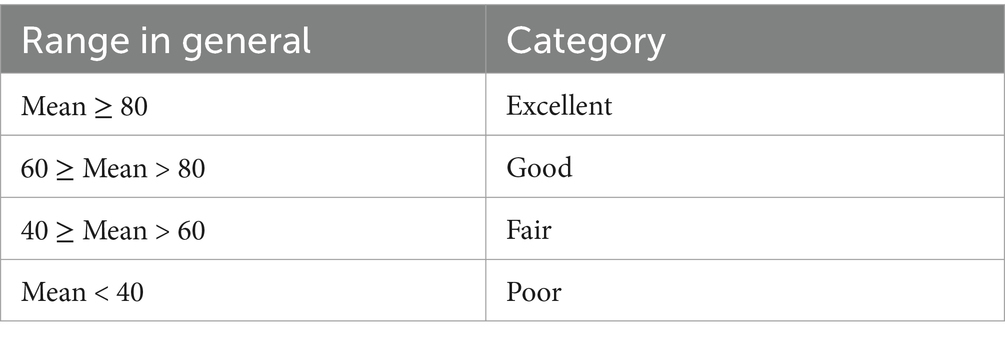
Table 1. Category for pre-service elementary teachers’ perspectives, mathematical knowledge, and didactic knowledge.
The pre-test and post-test were similar, but the order of questionnaires and tasks were randomly given to the participants to avoid bias on their answers. The pre-test was designed to gauge baseline knowledge, while the post-test aimed to measure improvement. This approach addresses concerns over potential biases in evaluating growth, ensuring a clear assessment of learning gains.
To ensure validity and reliability of the data, the first and fifth authors separately coded all prospective teachers’ answers. The inter-rate reliability of this coding resulted in a value of 0.87. For different results, we discussed and asked some opinions from other authors in decision making.
4 Results
The results of descriptive statistics relating to pre-service teachers’ perspectives, mathematical knowledge, and didactic knowledge are presented in Table 2. The pre-service teachers have better perspectives than mathematical and didactic knowledge. Pre-service teachers’ perspectives reach the highest mean score in the pre and post-test results. None of their pre-test scores achieve a good category or above. We have noticed that pre-service teachers have very poor didactic knowledge in the pre-test compared to the others. The standard deviation of this variable (SD: 26.61) reaches almost twice the standard deviation of the perspective variable. However, pre-service teachers’ didactic knowledge obtained the highest increase, namely 40.60, so the category changed from poor to good, the same as perspectives. This contrasts with teachers’ mathematical knowledge which only increased by 19.88, and the standard deviation remains the same at 24 points. Overall, pre-service teachers’ perspectives, mathematical, and didactic knowledge increase after the implementation of project-based ethno-didactics of mathematics learning.
A non-parametric statistical test (Wilcoxon) was conducted to test the hypothesis of whether there is a significant difference (level of significance = 0.05) of pre-service teachers’ perspectives, mathematical knowledge, and didactic knowledge between before and after the implementation of project-based ethno-didactics of mathematics learning. The non-parametric statistical test was used because there was data that was not normally distributed. The results of the Wilcoxon test revealed that there is a significant difference in pre-service teachers’ perspectives between pre and post-test (Table 3). Table 3 also shows that there is a significant difference in pre-service teachers’ mathematical and didactic knowledge between pre and post-test. These findings indicate that project-based ethno-didactics of mathematics learning has a significantly positive effect on pre-service teachers’ perspectives, mathematical knowledge, and didactic knowledge.

Table 3. Wilcoxon test for pre-service teachers’ perspectives, mathematical knowledge, and didactic knowledge.
To get a more detailed picture, we analysed each item of the perspective variable. As presented in Table 4, “knowing what ethnomathematics is and can explain it” obtained the highest mean value in the pre-test and the post-test. Meanwhile, “designing an ethno-didactics of mathematics-based learning instruction” reached the lowest score in both the pre-test and post-test. However, the perspectives in each item increased, and the highest increase is about explaining what ethno-didactics of mathematics is. This item also has the smallest standard deviation compared to other variables.
We also conducted the Wilcoxon test to determine whether each perspective item had a significant difference between the pre-test and post-test. As presented in Table 5, each item has a significant difference so it can be concluded that each item supports pre-service elementary teachers’ perspectives in implementing project-based ethno-didactics of mathematics learning in the course.
Among the four ethnomathematical tasks, the task about ratio was the most challenging for the pre-service elementary teachers. Where the average score for both pre-and post-tests is below 25% correct answer (Table 6). The task of ratio is that pre-service teachers are asked to determine the width of the photo frame of the Idrus Tintin building which is initially enlarged from 8 cm to… and the height of the photo is enlarged from 7 cm to 11.5 cm (Figure 1). Many pre-service teachers used additive reasoning rather than multiplicative reasoning, so they calculated the height of an enlarged photo is enough to add 4.5 cm to 8 cm. This technique is not appropriate for finding the height of the enlarged photo.
By using the Wilcoxon test, we found that pre-service elementary teachers’ mathematical knowledge did not significantly increase in solving ethnomathematical tasks about geometry. Their abilities are better than the other two tasks (M1 and M3), but in reality, implementing Project-based Ethno-Didactic of Mathematics Learning does not influence their mathematical knowledge about Geometry (Table 7).
Pre-service elementary teachers’ didactic knowledge was measured using their competencies in completing the Ethno-Didactic of Mathematics tasks (Table 8). They performed much better on the construction the ethno-didactic of mathematics task about measurement in the pre and post-test. However, they still struggled to construct the task on Geometry, particularly in distinguishing between Geometry and Measurements. Most of them constructed a similar didactic task for Geometry and Measurement.
The improvement of pre-service teachers’ didactic knowledge is supported by the increase in their knowledge of each item. For instance, participant 2 provided an answer for the Ethno-Didactic of Mathematics Task about Measurement in the pre-test as follows:
Bibi went to a traditional market to buy 5 kg of sugar, 20 dag of red onion, 3 hg of chilies, and 1 pound of garlic. When she was going home, she bought another 4 kg of potatoes. How many kg did she buy in total?
This answer was coded as partially correct answer due to a lack of ethnomathematics context as well as uncommon measurement units in the didactical task. However, she improved her answer in the post-test with a sufficient ethnomathematics context as follows:
If Adi wants to make a batik shirt with a waving coconut motif to a batik craftsman with a fabric 6 fathom long and 3 fathom wide. Then how many square meters of batik fabric are needed if 1 fathom is equal to 45 cm?
This answer was coded a fully correct answer because it provided an ethnomathematics context of batik. Batik is one of Indonesia’s cultural heritages that has been recognized by UNESCO (2009).
Based on the results of the Wilcoxon test, there was a significant increase in each of their abilities in constructing Ethno-Didactics of Mathematics tasks. This means that implementing Project-based Ethno-Didactics of Mathematics Learning has a considerable effect on each of pre-service teachers’ didactic knowledge (Table 9).
5 Discussion
The present study aims to evaluate the effect of Project-Based Ethno-Didactics of Mathematics Learning on pre-service elementary teachers’ perspectives, mathematical knowledge, and didactic knowledge. In general, there is a significant effect of the approach on these three variables, which will be discussed in detail in the following paragraphs.
Regarding the first hypothesis, the findings of this study indicate that Project-Based Ethno-Didactics of Mathematics Learning significantly affects pre-service elementary teachers’ perspectives regarding their competency in instructional methods based on Ethno-Didactics of Mathematics. This implies that project-based learning may be perceived as an appropriate instructional learning method by pre-service elementary teachers. However, it is important to clarify that the study did not directly investigate whether the project-based learning method itself is the sole cause of the improved perspective. Rather, the findings suggest that pre-service teachers believe project-based learning is an appropriate method. This finding builds upon previous research that has shown the positive effect of project-based learning on pre-service teachers’ self-efficacy (Mahasneh and Alwan, 2018). Additionally, integrating ethnomathematics into project-based learning enriches existing mathematics learning models, as previous studies have typically focused on presenting these ideas separately. For example, Kara and Togrol (2010) examined the effect of instruction integrated with ethnomathematics on students’ attitudes. This integration of ethnomathematics within project-based learning could offer a comprehensive alternative to support pre-service teachers, as well as students.
Project-Based Ethno-Didactics of Mathematics Learning also has a significant and positive effect on pre-service elementary teachers’ mathematical knowledge. Overall, pre-service elementary teachers showed improvement in their mathematical knowledge, although they struggled with tasks related to ratios. They tended to prefer additive reasoning over multiplicative reasoning. This finding is supported Çalışıcı (2018) study which found that students often have misconceptions when answering ratio-proportion problems due to confusion about the direction of the process in decreasing or increasing the numbers in the proportion. Additionally, there was no significant effect on the ethnomathematical task related to geometry. This suggests that geometry tasks can be challenging for some pre-service elementary teachers due to difficulties with spatial orientation and reasoning. This difficulty could be tied to the theoretical complexity of geometry, which involves abstract concepts like the properties of shapes and spatial reasoning. Moreover, spatial orientation is closely related to loops, conditions, and decomposition (Salac et al., 2023). Furthermore, it is important to consider the role of ethnomathematics in addressing these challenges. Ethnomathematics involves contextualizing mathematical concepts within students’ cultural contexts, and this approach can help bridge the gap between theoretical and practical knowledge. This could potentially aid pre-service teachers in better understanding of challenging mathematical concepts like geometry.
The last aspect that we investigate in this study is the effect of Project-Based Ethno-Didactics of Mathematics Learning on pre-service elementary teachers’ didactic knowledge. Their didactic knowledge is evaluated by their performance toward posing ethno-didactics of mathematics tasks based on several mathematics domains. Problem posing has been effective in evaluating pre-service teachers’ didactic knowledge (Afrillia et al., 2022; Putra et al., 2023). In general, pre-service elementary teachers were successful in posing ethno-didactics of mathematics tasks, but they had a little bit of challenges in posing the task related to Geometry. They tend to pose the task of measurement. This suggests that pre-service elementary teachers may have difficulty distinguishing between geometry and measurement. Therefore, pre-service elementary teachers in this study could have difficulties with the difference and connection between geometry and measurement. Therefore, we need to emphasis the theoretical lens of geometry as mathematical knowledge related to properties of shape and space such as figure distance, shape, size, and relative location. This distinction can be challenging for some students and teachers to grasp., especially because it belongs to a theoretical dimension as discussed in praxeology within the Anthropological Theory of the Didactic by Chevallard (2006). Therefore, further attention and support may be necessary to enhance the comprehension of geometry concepts in the context of mathematics instruction.
6 Concluding remarks, limitation, future research, and implication
In summary, the findings of our study suggest that the Project-Based Ethno-Didactics of Mathematics Learning holds excellent promise as an instructional model for enhancing pre-service teachers’ mathematical and didactic knowledge. It offers a dynamic approach that integrates cultural and real-world contexts and has demonstrated positive effects on various aspects of teacher competence. However, it is essential to acknowledge that our study has certain limitations.
One notable limitation is the relatively small sample size used in this research, which can impact the generalizability of our findings. Additionally, the absence of control groups in the study design makes it challenging to isolate the specific effects of the Project-Based Ethno-Didactics of Mathematics Learning model. Future studies are necessary to build upon this initial research and further strengthen the validity of the model. These studies should address our identified limitations, such as expanding the sample size and incorporating control groups for comparison. By doing so, we can develop a more comprehensive and robust understanding of the model’s perspectives and its potential impact on pre-service teachers’ mathematical and didactic knowledge. This ongoing research will contribute to refining and validating the model as a valuable tool in teacher education and professional development.
The study’s findings significantly contribute to innovative teaching methodologies by demonstrating the positive impact of the Project-Based Ethno-Didactics of Mathematics Learning on pre-service elementary teachers’ perspectives, mathematical knowledge, and didactic skills. This research enriches the existing knowledge base by emphasizing the potential of this approach for teacher training and highlighting the importance of infusing cultural and real-world contexts in mathematics education. However, it underscores the need for further investigation into optimizing the development of mathematical and didactic knowledge in specific content areas.
Additionally, policymakers can consider these findings when designing teacher education programs, with a focus on addressing challenges in enhancing learning, particularly in exact mathematical domains. For educators, this study provides insights into the benefits of incorporating elements of this approach into teaching practices. It emphasizes the importance of ongoing professional development to address specific challenges in various mathematical content areas, ultimately empowering teachers to better support their students’ learning.
Data availability statement
The raw data supporting the conclusions of this article will be made available by the authors, without undue reservation.
Ethics statement
The studies involving humans were approved by Lembaga Penelitian dan Pengabdian Universitas Riau. The studies were conducted in accordance with the local legislation and institutional requirements. The participants provided their written informed consent to participate in this study.
Author contributions
ZP: Conceptualization, Formal analysis, Funding acquisition, Writing – original draft, Writing – review & editing. NH: Supervision, Validation, Writing – review & editing. JA: Investigation, Methodology, Resources, Writing – review & editing. DD: Data curation, Investigation, Supervision, Visualization, Writing – review & editing. YG: Data curation, Formal analysis, Investigation, Writing – original draft.
Funding
The author(s) declare that financial support was received for the research and/or publication of this article. The authors thank the Faculty of Teacher Training and Education, University of Riau, for supporting this study under the grant research number 005/UN19.5.1.1.5/SPK/PT/2023.
Conflict of interest
The authors declare that the research was conducted in the absence of any commercial or financial relationships that could be construed as a potential conflict of interest.
Generative AI statement
The author(s) declare that no Gen AI was used in the creation of this manuscript.
Publisher’s note
All claims expressed in this article are solely those of the authors and do not necessarily represent those of their affiliated organizations, or those of the publisher, the editors and the reviewers. Any product that may be evaluated in this article, or claim that may be made by its manufacturer, is not guaranteed or endorsed by the publisher.
References
Afrillia, Y. M., Putra, Z. H., Noviana, E., Hidayat, R., and Dahnilsyah, D. (2022). The connection between prospective teachers’ procedural and conceptual knowledge with problem-posing skills of fractions. Int. J. Eval. Res. Educ. 11, 763–773. doi: 10.11591/ijere.v11i2.22202
Astari, A. J., Aliyan, S. A., Bratanegara, A. S., Muslim, A. B., Nurawaliyah, V. I., and Mohamed, A. A. A. (2024). Understanding the scope of regional geography: a perspective from indonesia’s geographic region. E3S Web Conf. 600:2018. doi: 10.1051/e3sconf/202460002018
Baum, B. S., Rowell, G. H., Green, L., Yantz, J., Beck, J., Cheatham, T., et al. (2017). Team-based introductory research experiences in mathematics. Primus 27, 389–405. doi: 10.1080/10511970.2016.1260079
Biehler, R., Scholz, R., Strässer, R., and Winkelmann, B. (1994). Didactics of mathematics as a scientific discipline. Mathematics Educ. Library 13, 9–13.
Blum, W., Artigue, M., Mariotti, M. A., Sträßer, R., Heuvel-Panhuizen, M., Maria Mariotti, A., et al. (2019). “European Didactic Traditions in Mathematics: Introduction and Overview” in European Traditions in Didactics of Mathematics. eds. W. Blum, M. Artigue, M. Mariotti, and R. Sträßer (Cham: Springer), 1–10.
Çalışıcı, H. (2018). Middle school students’ learning difficulties in the ratio-proportion topic and a suggested solution: Envelope technique. Univ. J. Educ. Res. 6, 1848–1855. doi: 10.13189/ujer.2018.060830
Chevallard, Y. (2006). “Steps towards a new epistemology in mathematics education” in Proceedings of the IV Congress of the European Society for Research in Mathematics Education. ed. M. Bosch (Cranves Sales: La Pensée Sauvage), 21–30.
Creswell, J. W., and Creswell, J. D. (2018). Research Design: Qualitative, Quantitative, and Mixed Methods Approaches. 5th Edn. London: SAGE.
Cueto, S., León, J., Sorto, M. A., and Miranda, A. (2017). Teachers’ pedagogical content knowledge and mathematics achievement of students in Peru. Educ. Stud. Math. 94, 329–345. doi: 10.1007/s10649-016-9735-2
D’Ambrosio, U. (1985). Ethnomathematics and its place in the history and pedagogy of mathematics. Learn.Mathematics 5, 44–48.
Dia, I. O., Putra, Z. H., Witri, G., Dahnilsyah, D., and Aljarrah, A. (2024). Development of a traditional game-based computational thinking supplementary textbook for elementary school students. Mathematics Teach. Res. J. 16, 185–206.
Díaz, V., and Poblete, A. (2017). A model of professional competences in mathematics to update mathematical and didactic knowledge of teachers. Int. J. Math. Educ. Sci. Technol. 48, 702–714. doi: 10.1080/0020739X.2016.1267808
Fendrik, M., Marsigit, M., and Wangid, M. N. (2020). Analysis of Riau traditional game-based ethnomathematics in developing mathematical connection skills of elementary school students. Elementar. Educ. Online 19, 1605–1618. doi: 10.17051/ilkonline.2020.734497
Gerdts, I., Izquierdo, I., and León, I. B. (2022). Indonesia / May 2022. Pamplona: Universidad de Navarra, 49. doi: 10.1136/bmjgh-2022-009557
Hendriyanto, A., Priatna, N., Juandi, D., Dahlan, J. A., Hidayat, R., Sahara, S., et al. (2023). Learning mathematics using an ethnomathematics approach: a systematic literature review. J. Higher Educ. Theor. Prac. 23, 59–74. doi: 10.33423/jhetp.v23i7.6012
Hill, H. C., Rowan, B., and Ball, D. L. (2005). Effects of teachers’ mathematical knowledge for teaching on student achievement. Am. Educ. Res. J. 42, 371–406. doi: 10.3102/00028312042002371
Hrynchak, P., and Batty, H. (2012). The educational theory basis of team-based learning. Med. Teach. 34, 796–801. doi: 10.3109/0142159X.2012.687120
Johar, R., Patahuddin, S. M., and Widjaja, W. (2017). Linking pre-service teachers’ questioning and students’ strategies in solving contextual problems: a case study in Indonesia and the Netherlands. Mathematics Enthusiast 14, 101–128. doi: 10.54870/1551-3440.1390
Kara, M., and Togrol, A. Y. (2010). Effects of instructional design integrated with ethnomathematics: attitudes and achievement. Learning Disciplines ICLS 1, 730–735. doi: 10.5555/1854360.1854453
Kemendikbudristek (2021). Buku Panduan Indikator Kinerja Utama Perguruan Tinggi Negeri. Ibukota Jakarta: Kemendikbudristek.
Lightner, S., Bober, M. J., and Willi, C. (2007). Team-Based Activities to Promote Engaged Learning. Coll. Teach. 55, 5–18. doi: 10.3200/CTCH.55.1.5-18
Mahasneh, A. M., and Alwan, A. F. (2018). The Effect of Project-Based Learning on Student Teacher Self-efficacy and Achievement. Int. J. Instr. 11, 511–524. doi: 10.12973/iji.2018.11335a
Makamure, C. (2025). “Project-based learning (pbl) for professional development of mathematics educators: unlocking opportunities and navigating pitfalls and considerations,” in Teacher Training and Student Learning - Past Values, Present Uncertainties and Future Prospects [Working Title]. IntechOpen.
Meissner, H. (2015). “Creativity in Mathematics Education,” in The Proceedings of the 12th International Congress on Mathematical Education.
Neto, T. B., Kamuele, L., and de Natividade, M. (2020). Assessing the didactic and mathematical knowledge of prospective mathematics teachers in Namibe, Angola. Afr. Mat. 31, 155–165. doi: 10.1007/s13370-019-00747-3
Novikasari, I., Muttaqin, A., and Elebiary, N. (2024). Teaching Math and Preserving Culture: The Intersection of Values in Indonesian Pedagogy BT - Values and Valuing in Mathematics Education: Moving Forward into Practice. Singapore: Springer Nature Singapore, 361–379.
OECD (2023). PISA 2022 Results (Volume I): The State of Learning and Equity in Education. Paris: OECD.
Orey, D., and Rosa, M. (2007). Cultural Assertions and Challenges Towards Pedagogical Action of an Ethnomathematics Program. Learn. Mathematics 27, 10–16. doi: 10.5642/jhummath.201602.03
Payadnya, I. P. A. A., Wulandari, I. G. A. P. A., Puspadewi, K. R., and Saelee, S. (2024). The significance of ethnomathematics learning: a cross-cultural perspectives between Indonesian and Thailand educators. J. Multic. Educ. 18, 508–522. doi: 10.1108/JME-05-2024-0049
Prahmana, R. C. I. (2022). Ethno-Realistic Mathematics Education: The promising learning approach in the city of culture. SN Social Sci. 2:257. doi: 10.1007/s43545-022-00571-w
Putra, Z. H. (2019a). Danish pre-service teachers’ mathematical and didactical knowledge of operations with rational numbers. Int. Electr. J. Mathematics Educ. 15, 619–632. doi: 10.29333/iejme/5775
Putra, Z. H. (2019b). Praxeological change and the density of rational numbers: The case of pre-service teachers in Denmark and Indonesia. EURASIA J. Mathematics Sci. Technol. Educ. 15, 1–15. doi: 10.29333/ejmste/105867
Putra, Z. H., Hermita, N., Afrillia, Y. M., and Dahnilsyah, D. (2022). The effect of gender, teaching experience, educational background, and the school type on teachers’ mathematical, didactic, and technological competences. Persp. Sci. Educ. 60, 612–624. doi: 10.32744/pse.2022.6.37
Putra, Z. H., Hermita, N., and Alim, J. A. (2021). Analisis pengetahuan matematika, didaktika, dan teknologi calon guru sekolah dasar menggunakan rasch model. Mosharafa: J. Pendidikan Matematika 10, 345–356. doi: 10.31980/mosharafa.v10i3.667
Putra, Z. H., Sari, I. K., and Dahnilsyah, D. (2023). Online formative assessment in mathematics education: prospective primary teachers’ understanding of rational numbers. J. Elementar. Educ. 16, 169–188. doi: 10.18690/rei.16.2.1232
Putra, Z. H., Witri, G., and Sari, I. K. (2020). Pengetahuan didaktika calon guru sekolah dasar tentang pecahan ditinjau dari teori antropologi didaktik [Prospective elementary teachers’ didactic knowledge about fractions based on anthropological theory of the didactic]. J. Elemen. 6, 244–261. doi: 10.29408/jel.v6i2.2056
Salac, J., Eatinger, D., and Franklin, D. (2023). The role of spatial orientation in diagram design for computational thinking development in k-8 teachers. Proc. 54th ACM Tech. Symposium Comput. Sci. Educ. 1, 917–923. doi: 10.1145/3545945.3569737
Shulman, L. (1986). Those who understand: knowledge growth in teaching. Educ. Res. 15, 4–14. doi: 10.3102/0013189X015002004
Tauro, F., Cha, Y., Rahim, F., Sattar Rasul, M., Osman, K., Halim, L., et al. (2017). Integrating mechatronics in project-based learning of Malaysian high school students and teachers. Int. J. Mech. Eng. Educ. 45, 297–320. doi: 10.1177/0306419017708636
Thanheiser, E., Moss, M., Browning, C. A., Garza-kling, G., and Watanabe, T. (2010). Developing mathematical content knowledge for teaching elementary school mathematics. IUMPST: J. 1, 1–13.
Winsløw, C., and Durand-Guerrier, V. (2007). Education of lower secondary mathematics teachers in Denmark and France. Nordic Stu. Mathematics Educ. 12, 5–32. doi: 10.7146/nomad.v12i2.148028
Wulandari, I. G. A. P. A., Payadnya, I. P. A. A., Puspadewi, K. R., and Saelee, S. (2024). The role of ethnomathematics in south-east asian learning: a perspective of indonesian and Thailand educators. Mathematics Teach. Res. J. 16, 101–119.
Keywords: didactic knowledge, ethno-didactics of mathematics, mathematical knowledge, pre-service elementary teachers, project-based learning
Citation: Putra ZH, Hermita N, Alim JA, Dahnilsyah D and Gunawan Y (2025) The role of project-based ethno-didactics of mathematics learning toward pre-service elementary teachers’ perspectives, mathematical, and didactic knowledge. Front. Educ. 10:1568366. doi: 10.3389/feduc.2025.1568366
Edited by:
Semirhan Gökçe, Ömer Halisdemir University, TürkiyeReviewed by:
Eduardo Hernández-Padilla, Autonomous University of the State of Morelos, MexicoDespina Desli, Aristotle University of Thessaloniki, Greece
Sevim Sevgi, Erciyes University, Türkiye
Hatice Nur Erbay, Istanbul University-Cerrahpasa, Türkiye
Copyright © 2025 Putra, Hermita, Alim, Dahnilsyah and Gunawan. This is an open-access article distributed under the terms of the Creative Commons Attribution License (CC BY). The use, distribution or reproduction in other forums is permitted, provided the original author(s) and the copyright owner(s) are credited and that the original publication in this journal is cited, in accordance with accepted academic practice. No use, distribution or reproduction is permitted which does not comply with these terms.
*Correspondence: Zetra Hainul Putra, emV0cmEuaGFpbnVsLnB1dHJhQGxlY3R1cmVyLnVucmkuYWMuaWQ=
 Zetra Hainul Putra
Zetra Hainul Putra Neni Hermita
Neni Hermita Jesi Alexander Alim
Jesi Alexander Alim Dahnilsyah Dahnilsyah
Dahnilsyah Dahnilsyah Yahya Gunawan
Yahya Gunawan